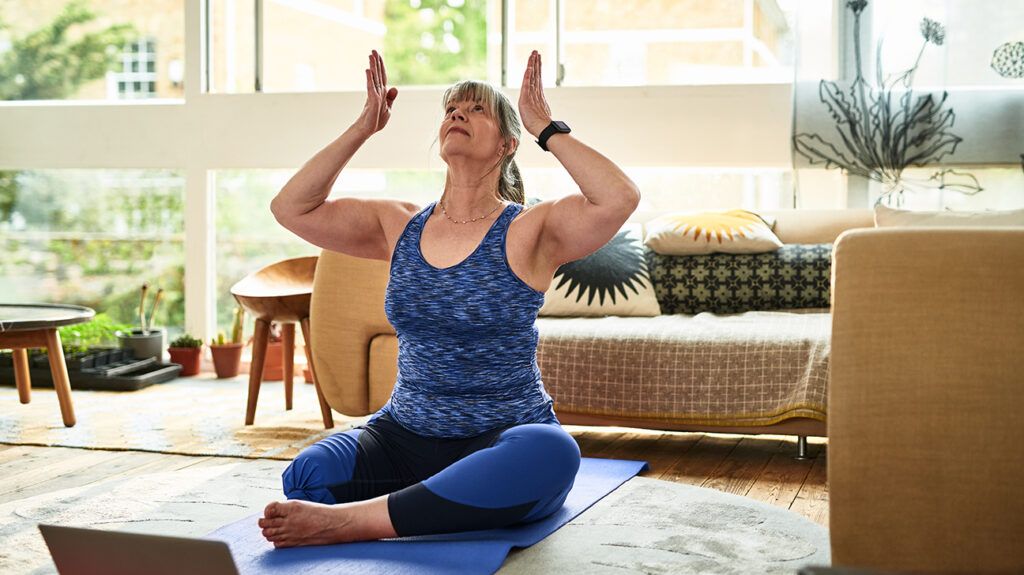While a doctor may prescribe certain meds or recommend different therapies, you may find that lifestyle changes, supplements, and more help to cope with anxiety.

If you’re living with anxiety, you may find that your current treatment only does so much. Or maybe you want to try some steps to reduce your anxiety before approaching a doctor.
While you should never stop taking a medication or start a new supplement before talking with a doctor, there are several lifestyle changes and more natural options to help treat anxiety that you might find helpful.
With about
But if you’re not sure you’re ready to try that route or may want to supplement your treatment, you might find that some of the following can help treat anxiety naturally.
Mindfulness therapies
Mindfulness is a practice often associated with meditation. It involves two concepts: paying attention to the present and how it makes you feel and then accepting and validating those feelings.
Mindfulness can allow you to recognize feelings of anxiety as valid but then release them so you don’t react negatively or entertain cognitive distortions. Experts have repeatedly noted the positive effects that mindful meditation or therapy have on stress, depression, and anxiety.
You might seek a therapist who can help you effectively use mindfulness to reduce anxiety. Or you can check out this guide on how to get started.
Exercise
Regular exercise
Still, exercise might not be a one size fits all model for managing stress. In a 2021 study, researchers looked at more than 200,000 skiers, and the effect long-term skiing had on reducing anxiety.
They found that while physical activity, in general, is helpful, some gender differences exist. Men typically reduced anxiety regardless of the time they achieved, while women tended to experience less chance of developing anxiety with lower intensity.
Writing
It may seem odd to some, but writing can help reduce anxiety. You might find that journaling or even creative writing can help you cope with anxiety. In a 2016 study, researchers found that creative writing and therapeutic stories helped teens and children with anxiety disorders.
You might try our guide to journaling for anxiety: 18 prompts to get you started.
Improving time management
If you find yourself waiting to the last minute to complete a project or are juggling too many commitments at once, you may discover that finding ways to better manage your own time can help.
Improved time management could mean reducing your schedule, starting earlier on projects, or breaking big jobs into smaller parts to make them more manageable.
You might benefit from Psych Central’s article on time management to manage stress in students.
Try herbal supplements
Herbal supplements often claim to provide stress and anxiety-reducing effects. They can come in:
Though they could help, it is important to remember that not much evidence supports their use. You should strongly consider speaking to a doctor before taking any new supplements, even if they are natural.
Aromatherapy
Aromatherapy could help you to reduce anxiety. Though more studies are needed, a
Relaxation exercises
When you’re anxious, you may discover you’re holding tension in your muscles. You can find stretches and exercises that help to loosen tight muscles can help. Taking time to stretch daily could also help.
You can bookmark this guide to yoga for anxiety: 9 poses to try.
Cannabidiol (CBD) oil
Cannabidiol (CBD) oil is a naturally occurring substance that comes from the cannabis plant. Several products contain CBD without tetrahydrocannabinol (THC), the compound that causes a high in cannabis.
Some early research suggests that CBD oil can help with multiple anxiety disorders. Folks can typically obtain CBD in different forms from a healthcare store or possibly with a prescription from a doctor.
There are far more options for treating anxiety in addition to medications.
While meds can help, you may find other therapies helpful or complementary to treatment. But it’s wise to consult a doctor before you stop medication or start a supplement.
Whether you work with a therapist one-on-one or in a group setting, a clinician will help you to figure out what activates your anxiety. From there, they will help you figure out how to cope when anxiety occurs. They can also help you identify lifestyle changes that could work best for you.
How to Find a Therapist
Looking for a therapist but not sure where to start? Psych Central’s How to Find Mental Health Support resource can help.
There are ways to treat your anxiety in addition to medication. You can try several methods to help reduce anxiety, such as:
- exercise
- mindfulness
- journaling
- supplements
Just keep in mind, that not every alternative treatment will work for you. You may find that exercise doesn’t work but working with a therapist does, for example.
If you find one method does not help, you can try a different strategy to see if you get any better results.
Is CBD legal? The 2018 Farm Bill removed hemp from the legal definition of marijuana in the Controlled Substances Act. This made some hemp-derived CBD products with less than 0.3 percent THC federally legal. However, CBD products containing more than 0.3 percent THC still fall under the legal definition of marijuana, making them federally illegal but legal under some state laws. Be sure to check state laws, especially when traveling. Also, keep in mind that the FDA has not approved nonprescription CBD products, and some products may be inaccurately labeled.
